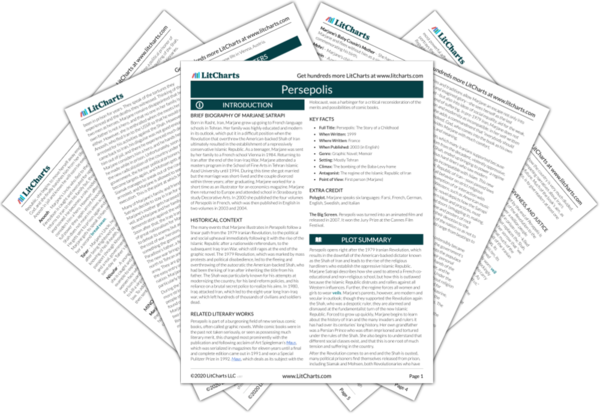The historical body count by the end of Persepolis is enormous: from the start of the Revolution to the end of the Iraq-Iran War over a million people die—on the battlefield, in the streets, and in prison cells—killed by the Shah and by the Islamic Republic that replaces the Shah. By the end of the book, Marjane expresses her sorrow that “we could have avoided it all”, indicating a belief that much of the damage done to the Iranian people was a result of the Iranian regime’s own actions: its warmongering with Iraq, its radicalization of young soldiers, its religious fanaticism, its valorization of martyrdom. Official, legally sanctioned punishment for infractions as small as an improperly worn veil or the possession of forbidden party fare could be shockingly severe, including torture and death, and the people who carry out these punishments are usually agents of the regime. As such, Marjane claims, “it was really our own who attacked us.”
Marjane must therefore contend with the reality of the complicity of the people around her. In the early days after the end of the Revolution, Marjane and her friends find out that Ramin’s father was part of the secret police under the Shah that killed many people. They decide to get revenge by holding nails between their fingers and attacking Ramin. However, Marjane’s mother teaches her that one cannot blame and punish the child of the perpetrator, who has nothing to do with the crimes committed. She claims that one must forgive, and Marjane takes this to heart. Later, however, after seeing the deaths perpetrated by the new Islamic Republic, she contradicts herself somewhat, saying that “bad people are dangerous, but forgiving them is, too.” This comment suggests the realization of an impossible situation, the realization that despite what the storybooks might say, forgiveness is not a cure-all, that forgiving bad people won’t magically turn them good. At one point, Marjane’s mother claims, “Don’t worry, there is justice on earth.” But the book seems to constantly question the veracity of this claim. In Persepolis little justice is to be found.
Violence, Forgiveness, and Justice ThemeTracker

Violence, Forgiveness, and Justice Quotes in Persepolis
I wanted to be justice, love, and the wrath of God all in one.

Unlock explanations and citation info for this and every other Persepolis quote.
Plus so much more...
Get LitCharts A+“The Revolution is like a bicycle. When the wheels don’t turn, it falls.”
“You know, my child, since the dawn of time, dynasties have succeeded each other but the kings always kept their promises. The Shah kept none.”
“All the country’s money went into ridiculous celebrations of the 2500 years of dynasty and other frivolities…all of this to impress heads of state; the population couldn’t have cared less.”
The reason for my shame and for the revolution is the same: the difference between social classes
“As long as there is oil in the middle east we will never have peace.”
My father was not a hero, my mother wanted to kill people…so I went out to play in the street.
“The real Islamic invasion has come from our own government.”
War always takes you by surprise.
“I wish he were alive and in jail rather than dead and a hero.”
“To have the Iraqis attack, and to lose in an instant everything you had built over a lifetime, that’s one thing…but to be spat upon by your own kind, it is intolerable!”
“Our country has always known war and martyrs, so, like my father said: ‘When a big wave comes, lower your head and let it pass!’”
“To die a martyr is to inject blood into the veins of society.”
“If [people] hurt you, tell yourself that it’s because they’re stupid. That will help keep you from reacting to their cruelty. Because there is nothing worse than bitterness and vengeance…Always keep your dignity and be true to yourself.”











